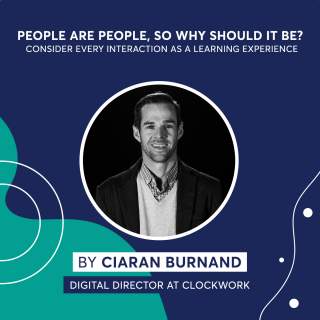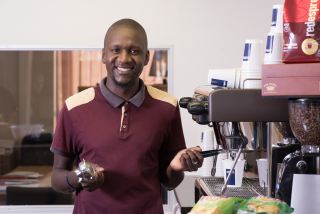People are people so why should it be?
So we're different colours and we're different creedsAnd different people have different needsIt's obvious you hate me though I've done nothing wrongI've never even met you, so what could I have done Lyrics written by the great Martin Gore of Depeche Mode and released in 1984 (No George Orwell reference just the year) but could just very well be lyrics from a song in 2021 about social media?So often online I see articles, tweets or people talking about how to succeed in this, or how to earn more money doing that.
So many people chasing the latest or the trendiest piece of digital flesh out there. Digital cult cannibals ready to consume the latest offering or blindly follow the next influencer in order to appear more knowledgeable and climb the ladder. The higher the ladders goes the more things change.
At Clockwork https://www.clockworkmedia.co.za and https://www.clockworkmedia.co.uk we run a mentoring programme, where the more experienced or senior people in the company, ‘pitch themselves’ to our large pool of stirring and cool up-and-comers. The premise is that they are then selected as a mentor to help guide people on their work journey.
During this process the one line of questions that seems to appear more often is this….”How do I build my career?” “When do I know to move on to the next level?” “What should I do to progress in my career?”I can only respond with what my personal experience and knowledge has been, which is that in order to succeed, you need to understand people.
For me the biggest challenges and achievements have all revolved around people. The biggest learnings I have came from interactions with people. Looking back on my experience now, the fact that I managed people, since I was about 19, has provided me with many grey hairs with a significant amount of different scenarios and situations.
All of these have helped me build my People IA: Intelligence Amplification or Intelligence Augmentation. This is in fact the opposite of AI: Artificial Intelligence. To quote from this Forbes article https://www.forbes.com/sites/quora/2017/03/02/the-opposite-of-artificial-intelligence-could-be-the-key-to-saving-tech-jobs/
“Our brains are more complex than any computer we know how to make, our brains are also far more creative.”So my guidance to help you succeed is to become a Generalist of People. Consider every single interaction as a learning experience. Allow this interaction to shape your approach.
Once you know what your approach to people is, stick to those doctrines, preach them to yourself and others. People won’t always listen to you the first time…or second time…or third time! It requires constant attention and commitment. In addition, listen to people, really listen. Through my 25 years of interactions I have slowly but surely found my guiding principles. They speak to me because they align to my own beliefs not just because I think they would sound cool.
Because of that it is natural for me to live and preach them…another key element to progress. A balance with your views is fundamental.
Also have the foresight to realise that your teams and your own views will need to adjust over time to consider such things as working from home. Kindness is one of my key values, along with having fun and giving a sh!t! None of this is groundbreaking or new but it links directly to people, not trends, not technology. Kindness provides the ability for people to be people. It provides a fertile environment to care about mental health. And above all else, kindness is free but is worth so much.
When teams (made of people) each put in an extra layer of kindness even just a small percentage each, the combined impact is exponential. This aids in developing a space where help is the norm and people consider their communication and interactions.
But what exactly is kindness? Don’t just take my word for it, the South African College of Applied Psychology have this to say: “Kindness means different things to different people and it can be expressed in many varying ways. Kindness is an intentional action and often causes a positive chain reaction. At its basic level, it is being friendly, considerate and generous. You can see it in action when someone is gentle, warm, affectionate, empathetic or concerned about someone else. To be kind isn’t a weakness.
Often it takes courage and strength to be kind. Especially when doing so continuously is difficult, unappreciated or unreciprocated.
”The full article can be access here https://www.sacap.edu.za/blog/applied-psychology/kindness/
But why do we need kindness?My wife shared an article with me last night that helped me close off and understand why. I believe that kindness helps with our Window of Tolerance. The Window of Tolerance, developed by Dan Siegel describes the best state of stimulation in which we are able to function and thrive in everyday life. When we exist in this window, we can learn effectively, play and relate well to ourselves and others.
Everybody’s Window of Tolerance is different, but by providing a kinder environment we allow more room for tolerance. Getting back to Depeche Mode, I finish with this:“I'm relying on your common decencySo far, it hasn't surfaced but I'm sure it exists”
What does Corporate Social Investment mean to you?
No longer is CSI seen as a charitable donation, an enhanced corporate image, a tax write-off or a solution for the corporate conscience, but rather as contributing to the real needs of the community in which you operate. More sustainable growth could be delivered if management could see CSI as part of their strategic environment, contributing to real social development and economic progress.
A popular approach to CSI is mentoring – affording previously disadvantaged individuals the opportunity to develop skills and an understanding of how best to manage their careers, how their actions impact on their success and how to improve on the things they are good at, to grow and to make their mark in the world. Anyone can be a mentor – regardless of current position – as there is always someone who is less experienced or just starting out who is looking for guidance.
Konrad Laker, CEO of Gold Travel, believes that it is imperative for any business operating in South Africa to be a part of the solution and not the problem in contributing to Corporate Social Investment (CSI) and to look at other ways of giving back, and not necessarily just with the focus of improving your bottom line.
Under Laker’s guidance and support, young entrepreneur Tendai Chawasarira, a qualified Barista, was able to open his own coffee shop, Bean@Beuna, in their office block and he is enormously grateful for the opportunity. “I am able improve my skills and work experience, which has ignited my passion for coffee again; the ideas for a bigger menu are flowing, and with our client base growing I am about to hire extra staff.” The potential of uplifting the community has improved, and employee morale is also enhanced with the buy-in and support of everyone in the office and the corporate park.
Laker believes CSI is a give-and-take scenario – you give to plough back into the community and take to identify potential contributors for your own business, from a pool of beneficiaries.He is committed to spending more time on mentoring and once this model has proved to be working, would like to start using it as a template for other qualifying individuals.
Mentoring is an enriching process both for yourself and for the mentoree, as you will be making an important difference to someone else while at the same time refining some of your own personal and work practices – the gift that keeps on giving.



